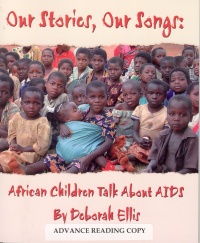| ________________
CM . . .
. Volume XII Number 1 . . . .September 2, 2005
excerpt:
Deborah Ellis traveled to Malawi and Zambia in 2003 to meet with children affected by the AIDS crisis in Sub-Saharan Africa. This book is a record of her interviews with children living in a variety of different situations, from prisons and the street to hospitals and relatives' houses. I don't think it's possible to read this book and come away untouched by the stories it contains. Heartbreaking patterns emerge over the course of the book and the one that is repeated over and over again is the story of one or both parents growing thinner and thinner, sicker and sicker, until they die. Their children are not told what made their parents die, or they are told that the parent(s) died of tuberculosis. AIDS testing is not common, and no one wants to discuss the disease because of the social stigma it still carries. Many of the children talk about the AIDS education they are getting in school, but they do not seem to have linked the theory of the disease to the practicality of their situations. Although their stories are sad, there are also touching and hopeful moments in this book, particularly when the children talk about their dreams for the future. Many of the boys hope to become truck or bus drivers so that they can see more of the world. The girls have different aspirations, but many hope to become nurses to help the sick and dying. Nedia, a 13-year-old choir member from Diante, says:
Ellis does not include her interview questions, but instead she presents the children's uninterrupted narratives. This decision gives the stories a feeling of immediacy, as though the orphans are speaking directly to the reader. The accompanying photograph of each child only heightens this impact. Ellis prefaces each different setting (prison, hospital, AIDS Club, etc.) with a paragraph or two about how she got there and what she saw. In the advance reading copy, there are fact boxes sprinkled through the early chapters. These seem "stuck in" and can be out of context, and some boxes have titles while others do not—this will hopefully be tidied up for the final printing of the book. Ellis includes fact sheets at the end of the book. There are lists of:
A map of the region is also included, as are a bibliography and a list of AIDS-fighting and orphan-helping organizations. Ellis does an excellent job of bringing the children's stories together with clear information about the problems of AIDS, child labour, poverty, and women's rights. Although this book packs a mighty emotional wallop for complacent Canadians, Ellis also manages to find hope, and her conclusion is a rousing call to action. Royalties from the sale of the book will be donated to Unicef. A must-have for all libraries, and a must-read for everyone. Highly Recommended. Grace Sheppard is a Children's Librarian with the Ottawa Public Library in Ottawa, ON.
To comment
on this title or this review, send mail to cm@umanitoba.ca.
Copyright © the Manitoba Library Association. Reproduction for personal
use is permitted only if this copyright notice is maintained. Any
other reproduction is prohibited without permission.
NEXT REVIEW |
TABLE OF CONTENTS FOR THIS ISSUE
- September 2, 2005.
AUTHORS |
TITLES |
MEDIA REVIEWS |
PROFILES |
BACK ISSUES |
SEARCH |
CMARCHIVE |
HOME |
